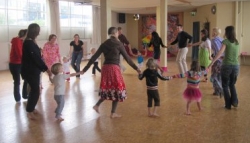Principles
- self-help and self-responsibility are required for successful development
- participation in public decision making should be free and open to all citizens
- methods that produce accurate information about the community are vital to the process
- understanding and general agreement is the basis for community change
- all individuals have the right to be heard in open discussion, whether in agreement or disagreement with community norms, and the responsibility to respect opposing viewspoints
- trust is essential for effective working relationships
Values
- all people have a basic dignity
- people have the right to participate in decisions that affect their current and future well-being
- participatory democracy is the superior method of conducting the civic business of the community
- people have the right to strive to create an environment they desire
- people have the right to reject an externally imposed environment
- maximising purposeful interaction and dialogue within a community will increase the potential for learning and development
- implied within a process of purposeful interaction is an ever-widening concept of community
- every discipline and profession is a potential contributor to a community development process
- motivation is created through interaction with the environment
Assumptions
- people are capable of rational behaviour
- significant behaviour is learned behaviour
- significant behaviour is learned through interaction over time
- people are capable of giving purposeful direction to their behaviour
- people are capable of impacting their collective environment to formulate a desired future
Reference

